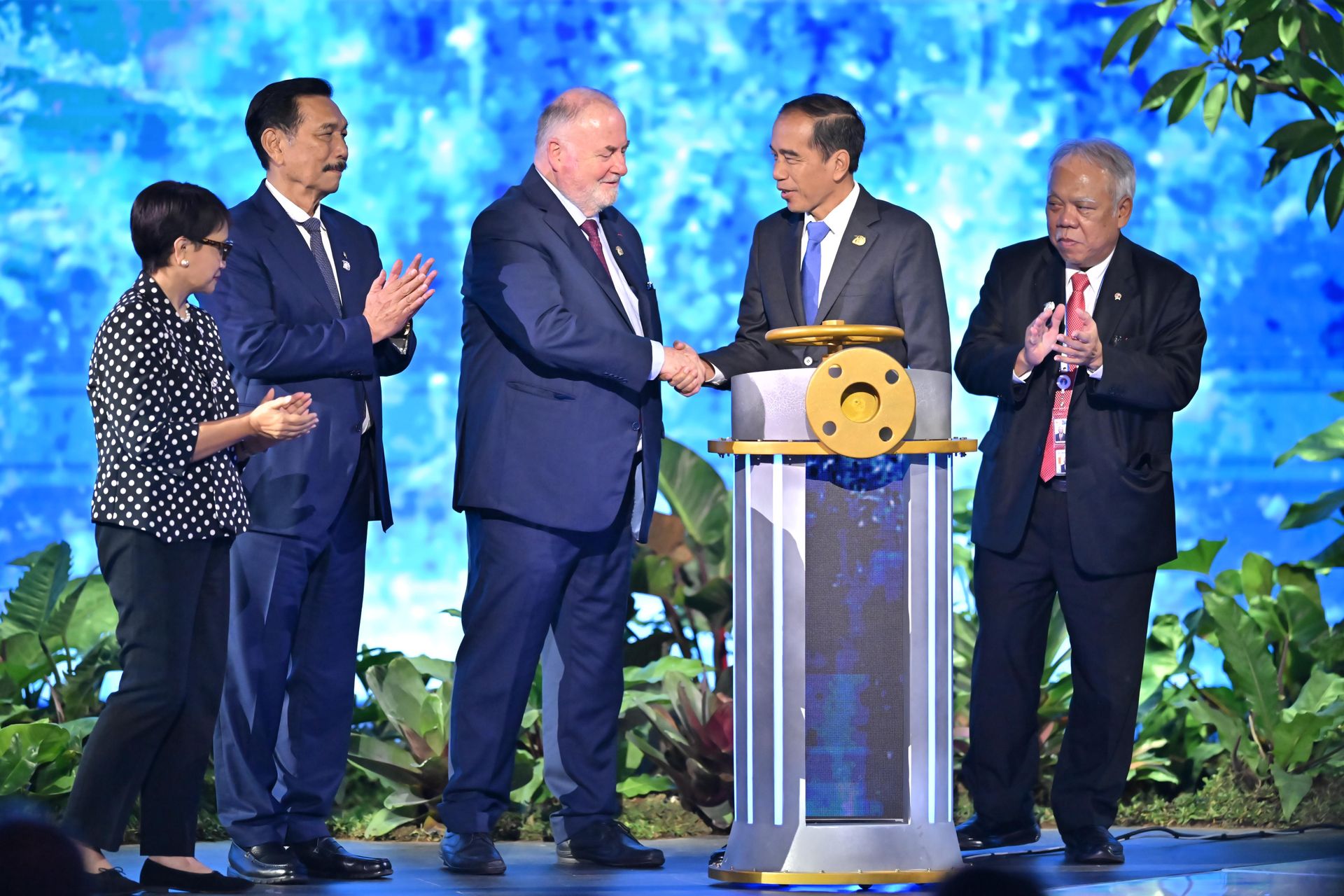Badung, 20 May 2024 – Indonesian President Joko “Jokowi” Widodo opened the High-Level Meeting of the 10th World Water Forum at Bali Nusa Dua Convention Center (BNDCC), Bali, on Monday morning, 20 May.
President Jokowi stated that countries worldwide should use the largest global water forum as momentum to revitalize real action and joint commitment to water by sharing knowledge, encouraging innovative solutions, and implementing integrated water resources management.
“It aims to strengthen commitment and formulate real actions related to inclusive and sustainable water management,” Jokowi said.
The President also emphasized water’s crucial and central role in human life. Water’s importance is so great that it is often referred to as the next oil of the future.
From the economic perspective, President Jokowi said that water shortages could slow economic growth by up to 6 percent by 2050.
Therefore, before the participants of the 10th World Water Forum, President Jokowi revealed that in the last 10 years, Indonesia has strengthened its water infrastructure by building 42 dams and 1.18 million hectares of irrigation networks; rehabilitating 43 million hectares of irrigation networks; and constructing 2,156 kilometers of flood control and coastal protection.
Indonesia also utilizes water resources by building the Ciatra Floating Solar Power Plant (PLTS). The PLTS is the largest in Southeast Asia.
“But all these efforts are not enough. Water and sanitation problems will become increasingly serious in the future. These efforts must be strengthened at the global level, involving the state, the private sector, and civil society. The 10th World Water Forum is a strategic step to take real action and to make a joint commitment to realize integrated water resources management,” the President said.
According to the President, Indonesia has consistently pushed for three things at the forum. First, it aims to enhance the principles of solidarity and inclusiveness to address common challenges, especially for small island countries that experience water scarcity.
The second is empowering hydro-diplomacy for concrete and innovative cooperation according to the needs of recipient countries while preventing competition in managing cross-border water resources based on international law.
The third is strengthening political leadership as the key to the success of various forms of cooperation toward sustainable water security.
For those reasons, Indonesia has adopted four new initiatives, namely the establishment of World Lake Day; the establishment of the Center of Excellence in the Asia Pacific Region for water and climate security; sustainable water management in small island countries, and the promotion of water projects to ensure political commitment, translating our words into tangible action.
“Water is more than just a natural resource, it’s a collaborative force that binds us together and unites us. Preserving water is our collective responsibility,” President Jokowi concluded in his remarks.
Previously, World Water Council President Loïc Fauchon encouraged the heads of state and delegations present to incorporate the right to water into the constitutions, laws, and regulations of their respective countries. He emphasized that this step would expedite the achievement of justice for access to water and sanitation worldwide.
“So, step by step, we can advocate for the right to access water to be upheld for everyone,” he said.

On that occasion, Loïc Fauchon announced that his organization would introduce the "Money for Water" coalition at the upcoming United Nations conference and extend invitations to all countries to join. The coalition aims to address sub-sovereignty and water debt cancellation for the world's poorest countries.
“We aim to ensure that majority climate funding is primarily dedicated to water, including wastewater,” he stated.
In concluding his remarks, Loïc Fauchon also called on international action to ensure more active and decentralized governance based on multilateral cooperation.
“As we do in this forum, it is also important to strengthen mediation rules for rivers, lakes, and watersheds. Water diplomacy brings peace to the shores, instead of bringing war to the river,” he added.
Apart from that, hydro-diplomacy represents a concrete and innovative approach to managing cross-border water resources.
As an outcome of the forum, a ministerial declaration will be ratified, incorporating three of Indonesia's national interests, namely proposing World Lakes Day, establishing a Center of Excellence for Water and Climate Security, and advocating for integrated water resources management on small islands.
In addition to opening the High-Level Meeting, President Jokowi is also scheduled to visit Tahura Ngurah Rai, Bali, accompanied by state leaders and delegates from the 10th World Water Forum. (MoFA/TR/Elvira Inda Sari)
****
For further information, please contact:
Director General of Public Information and Communications of the Ministry of Communications and Informatics – Usman Kansong (0816785320).
PCO of the 10th World Water Forum - Dede Ariwibowo (08111830020).
Get more information at https://infopublik.id/kategori/world-water-forum and https://s.id/worldwaterforumpedia.